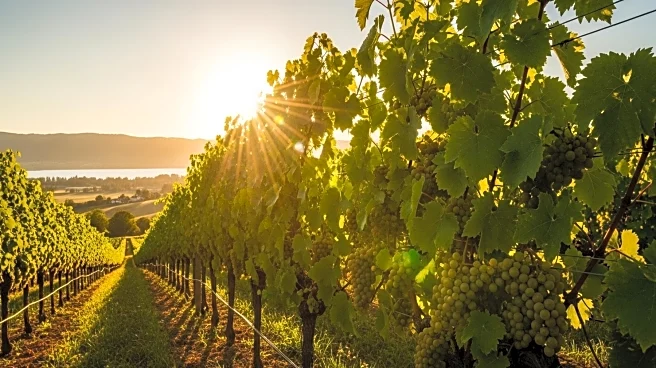What is the story about?
What's Happening?
The wine industry is confronting significant challenges due to climate change, with a study published in Nature Reviews Earth & Environment in 2024 indicating that up to 70% of current wine-producing regions could become unsuitable for grape cultivation if global temperatures rise by more than 2°C above pre-industrial levels. This situation is particularly dire for traditional wine regions in coastal and lowland areas of Spain, Italy, Greece, and southern California, where up to 90% could be at risk of disappearing by the end of the century due to drought and heatwaves. The Penedès region in Spain, with a winemaking history dating back to the 7th century BC, exemplifies the vulnerability of these areas. The wine industry is adapting by embracing organic and regenerative viticulture, planting vineyards at higher altitudes, and switching to grape varieties better suited to warmer climates.
Why It's Important?
The potential loss of significant wine-producing regions poses a threat not only to the wine industry but also to the economies and cultural heritage of affected areas. Wine regions are often integral to local economies, providing jobs and supporting tourism. The shift in suitable growing areas could lead to economic displacement and loss of cultural identity tied to traditional winemaking practices. Additionally, the wine industry serves as a microcosm of broader agricultural challenges posed by climate change, highlighting the need for sustainable practices and innovation in agriculture. The industry's response, including the adoption of renewable energy and carbon capture technologies, could serve as a model for other sectors facing similar climate-related challenges.
What's Next?
The wine industry is likely to continue its efforts to adapt to climate change through innovation and collaboration. Initiatives such as the International Wineries for Climate Action (IWCA) aim to accelerate the decarbonization of the global wine industry through collective action. As more wineries join these efforts, the industry may see increased adoption of sustainable practices and technologies. Policymakers and consumers will play crucial roles in supporting these changes, with potential policy shifts towards reducing fossil fuel dependency and promoting sustainable agriculture. The industry's future will depend on its ability to adapt to changing climate conditions while maintaining economic viability and cultural significance.
Beyond the Headlines
The challenges faced by the wine industry due to climate change also raise ethical and environmental questions about the sustainability of current agricultural practices. The industry's reliance on fossil fuels and plastic packaging contributes to greenhouse gas emissions and environmental degradation. Addressing these issues requires a holistic approach that considers the entire supply chain, from production to distribution. The industry's efforts to reduce its carbon footprint and promote biodiversity through practices like regenerative viticulture could have long-term benefits for the environment and set a precedent for other industries. The success of these initiatives will depend on widespread collaboration and a shift in consumer and industry mindsets towards sustainability.
















